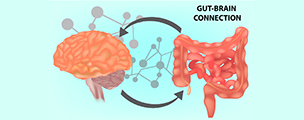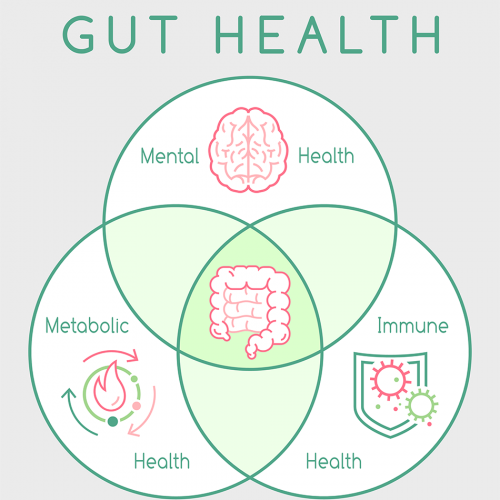
The gut is responsible for making 95% of our serotonin? If gut function is compromised then serotonin levels drop, having a direct impact on your brain and body. Low serotonin is associated with chronic depression and anxiety disorders, interrupting sleep patterns and a higher sensitivity to pain throughout the body.

The gut is known as our second brain. It is made up of a complex and fully functional neural network containing over 500 million neurons, constantly sending and receiving nerve signals. Research has shown that the gut brain can learn, store memories and perform complex independent processing. Why is this important? Because what’s happening in the gut has a direct impact on how your brain is functioning.

We’ve known for over 2,000 years that our health starts in our gut. Hippocrates was the first to state that all diseases begin in the gut. We now have a much better understanding of why that is.
First let’s look at the gut/brain connection. We’ve all experienced how our thoughts and emotions can impact our physical body. Suppose we have a big event coming up—we feel stress, our heart rate increases, our breathing gets faster and shallower. More often than not, we experience digestive disturbances—we literally feel it in our gut. Sometimes it’s a good feeling like butterflies; other times it can be more debilitating, like diarrhea. You can think of this as top-down messaging from our ‘head brain’ to our body. Our thoughts and feelings literally impact our physical body.

There are also messages that go from the body to the brain. In fact, the body and brain are deeply interconnected with messages going back and forth. The gut, known as our second brain, is made up of a complex and fully functional neural network containing over 500 million neurons, constantly sending and receiving nerve signals. The gut is also a vast chemical and neuro-hormonal warehouse utilizing every class of neurotransmitter found in the head brain. Did you know that 95% of our serotonin is made in the gut—provided that our gut is functioning correctly? Research has shown that the gut brain can learn, store memories and perform complex independent processing. Why is this important? Because what’s happening in the gut has a direct impact on how your brain is functioning.
More on the gut. Two main factors have a huge influence on our overall health. First, the health of the internal bacteria, or microbiome. Second, the integrity of the gut lining, or mucosal barrier. If the microbiome is not healthy, or the gut lining becomes leaky, chronic health problems that seem unrelated to digestive health will likely occur. This could be head issues like brain fog, lack of concentration, anxiety, depression. Body issues might include bloating, constipation, diarrhea, gas, weight gain, skin issues, allergies, autoimmune conditions, diabetes, and so on. The gut has a direct impact on other areas of our body and our brain.
What impacts the gut?
If you experience chronic digestive issues let’s talk about functional testing. A functional GI test looks for pathogens such as parasites, as well as pathogenic, opportunistic and normal bacteria, funguses and viruses. Gut functional markers are also reported on. The information from this testing is useful in developing your personal change plan including steps to re-inoculate, repair and rebalance the gut.
We believe in passing on Knowledge
Visit our Living Your Excellence Blog
Are you ready for empowered change? It’s time to live your excellence. Choose from our articles below to explore how the latest advances in neuroscience create opportunities for harnessing the power of neuroplasticity, and create a space for inspiration to flow.
———————————
Federal Department of Consumer Affairs and Board Of Behavioral Science Notifications For Consumers